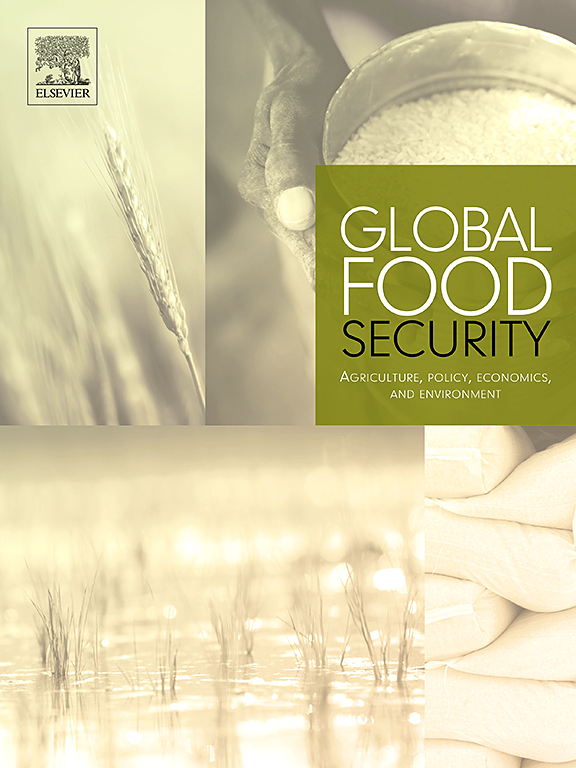消费者对食用昆虫及其衍生产品的偏好和支付意愿的全球审查
IF 9.6
1区 经济学
Q1 FOOD SCIENCE & TECHNOLOGY
Global Food Security-Agriculture Policy Economics and Environment
Pub Date : 2025-03-01
DOI:10.1016/j.gfs.2025.100834
引用次数: 0
摘要
在人口增长、城市化、经济发展和气候变化的推动下,全球对蛋白质的需求不断上升,这凸显了对可持续替代蛋白质来源的需求。食用昆虫已成为一种可行的解决方案,可加强粮食饲料和营养安全,同时有助于废物管理。本研究回顾了128篇同行评议的出版物,以评估消费者对食用昆虫及其衍生物的偏好和支付意愿。研究结果显示,研究主要集中在欧洲和昆虫基食品上,对昆虫基饲料和衍生产品的研究有限。与西方国家的消费者相比,非洲、亚洲和拉丁美洲的消费者对昆虫食品的接受度更高,而西方国家的消费者对新事物的恐惧、厌恶和意识有限等心理障碍阻碍了他们的接受。以昆虫为基础的食品的消费意愿各不相同,一些消费者愿意支付溢价,而另一些消费者则希望价格低于传统食品。将食用昆虫纳入可持续粮食和饲料系统需要公众教育、创新营销和扩大生产。本文章由计算机程序翻译,如有差异,请以英文原文为准。
Global review of consumer preferences and willingness to pay for edible insects and derived products
The rising global demand for protein, driven by population growth, urbanization, economic development, and climate change, underscores the need for sustainable alternative protein sources. Edible insects have emerged as a viable solution to enhance foodfeed and nutritional security while contributing to waste management. This study reviews 128 peer-reviewed publications to assess consumer preferences and willingness to pay (WTP) for edible insects and their derivatives. Findings reveal that studies predominantly focus on Europe and insect-based foods, with limited research on insect-based feeds and derived products. Consumers in Africa, Asia, and Latin America show higher acceptance of insect-based food compared to those in Western nations, where psychological barriers such as neophobia, disgust, and limited awareness hinder adoption. WTP for insect-based foods varies, with some consumers willing to pay a premium while others expect lower prices than conventional options. Integrating edible insects into sustainable food and feed ssytems requires public education, innovative marketing, and scaling up production.
求助全文
通过发布文献求助,成功后即可免费获取论文全文。
去求助
来源期刊

Global Food Security-Agriculture Policy Economics and Environment
FOOD SCIENCE & TECHNOLOGY-
CiteScore
20.90
自引率
3.40%
发文量
69
期刊介绍:
Global Food Security plays a vital role in addressing food security challenges from local to global levels. To secure food systems, it emphasizes multifaceted actions considering technological, biophysical, institutional, economic, social, and political factors. The goal is to foster food systems that meet nutritional needs, preserve the environment, support livelihoods, tackle climate change, and diminish inequalities. This journal serves as a platform for researchers, policymakers, and practitioners to access and engage with recent, diverse research and perspectives on achieving sustainable food security globally. It aspires to be an internationally recognized resource presenting cutting-edge insights in an accessible manner to a broad audience.
 求助内容:
求助内容: 应助结果提醒方式:
应助结果提醒方式:


